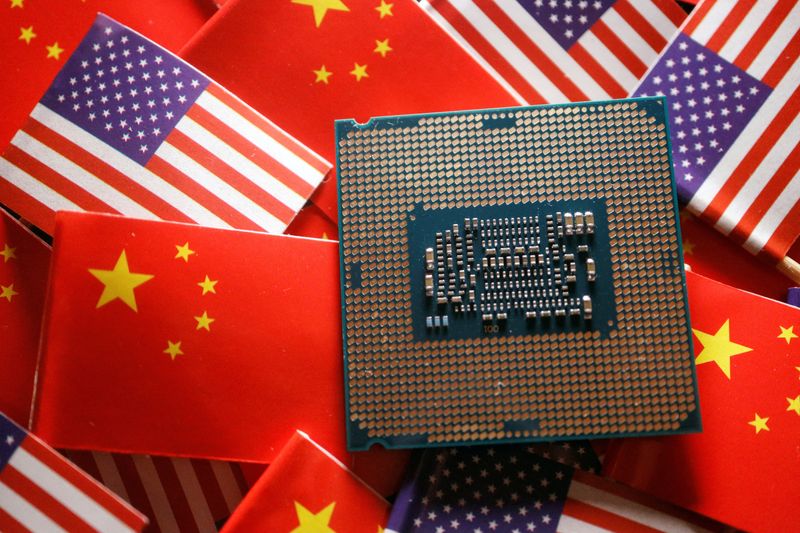By Michael Martina
WASHINGTON (Reuters) - For over 40 years, a landmark agreement between the United States and China has yielded cooperation across a range of scientific and technical fields, a powerful sign that the rivals could set aside their disputes and work together.
Now with bilateral relations in their worst state in decades, a debate is underway within the U.S. government about whether to let the U.S.-China Science and Technology Agreement (STA) expire later this year, three officials familiar with the discussions said.
With Antony Blinken in Beijing on the first visit by a secretary of state in five years and expectations low for any bilateral breakthrough, the debate over the oldest U.S.-China bilateral cooperation accord mirrors a bigger question dividing policy makers: do the benefits to the U.S. of engaging with China outweigh the risk of empowering a competitor who may play by different rules?
The agreement, signed when Beijing and Washington established diplomatic ties in 1979 and renewed about every five years since, has been hailed as a stabilizing force for the countries' relations, with collaboration in areas from atmospheric and agricultural science to basic research in physics and chemistry. It laid the foundation for a boom in academic and commercial exchanges.
Those exchanges helped China grow into a technology and military powerhouse, but concerns about Beijing's theft of U.S. scientific and commercial achievements have prompted questions about whether the agreement – set to expire on Aug. 27 – should continue.
Proponents of renewing the STA argue that ending it would stifle academic and commercial cooperation.
While the dominant U.S. view appears to be in favor of renewal, a growing contingent of officials and lawmakers believe cooperating on science and technology makes less sense given competition between the countries, said the officials, speaking on condition of anonymity due to the sensitivity of the issue.
"Extending the Science and Technology Agreement between the U.S. and China would only further jeopardize our research and intellectual property," said Representative Mike Gallagher, the Republican chair of a congressional select committee on China. "The administration must let this outdated agreement expire."
The State Department declined to comment on "internal deliberations on negotiations." The National Security Council also declined to comment.
China's embassy in Washington said Chinese officials had approached the U.S. a year ago to talk about the deal, which it said formed the basis for 40 years of "fruitful" cooperation.
"As far as we know, the U.S. side is still conducting an internal review on the renewal of the agreement," embassy spokesperson Liu Pengyu said, adding that both sides could consider adjustments to the original deal.
"It is hoped that the U.S. side will expedite the internal review before the expiration of the agreement," he said.
RENEW, EXPIRE OR RENEGOTIATE?
Inside the U.S. government, including the State Department, which leads the negotiations, there are competing views about whether to renew the pact, let it expire or renegotiate to add safeguards against industrial espionage and require reciprocity in data exchanges, the officials said.
Given the state of U.S.-China ties, trying to renegotiate could derail the agreement, they said.
U.S. businesses have long complained about Chinese government policies that require technology transfer, and experts warn about state-sponsored theft of everything from Monsanto (NYSE:MON) crop seeds to data about NASA's space shuttle designs.
The administration of President Joe Biden has sharpened the focus on technological competition.
"Technology will be the cutting-edge arena of global competition in the period ahead in the way nuclear missiles were the defining feature of the Cold War," U.S. Indo-Pacific coordinator Kurt Campbell told a Hudson (NYSE:HUD) Institute forum in June, adding that the U.S. "will not cede the high ground."
Proponents of renewing the deal argue that without it, the U.S. would lose valuable insight into China's technical advances.
"China friend or China foe, the U.S. needs access to China to understand what's happening on the ground," said Denis Simon, a professor at the University of North Carolina at Chapel Hill who studies technology strategy in China, adding that it was important for the U.S. to negotiate a fundamentally new agreement.
"The advocates for renewal are trying to keep this (issue) a little bit under the radar because they don't want the China bashers to get a piece of this and try to rip it apart," he said.
Anna Puglisi, a former U.S. counterintelligence official focused on East Asia and now a senior fellow at Georgetown University's Center for Security and Emerging Technology, said science and technology cooperation had at one time been the "feel good" part of relations, but that has changed.
She said there are questions about what renewed cooperation could achieve at a time when China's national security laws now cover the export of data and the country is taking steps to limit foreign access to its domestic academic databases.
"There has to be transparency and there has to be reciprocity," said Puglisi. "And the U.S. government needs to do a full accounting of what have we gotten out of this besides a couple of meetings."
